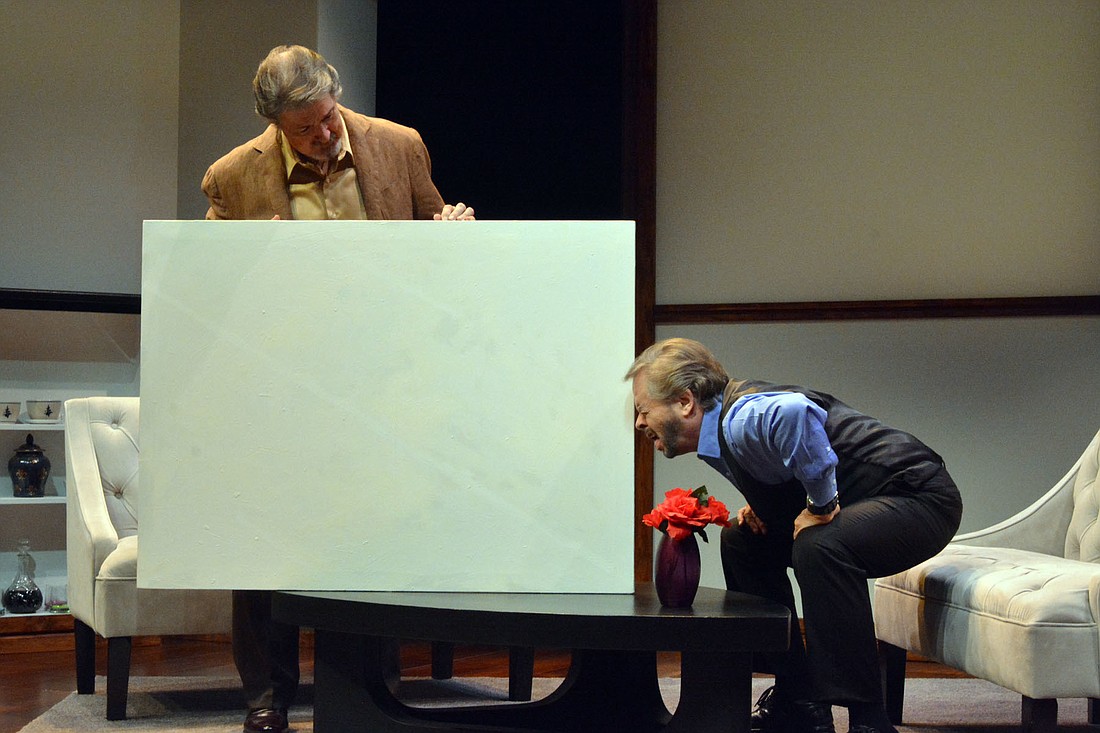- July 26, 2024
-
-
Loading

Loading

Yasmina Reza’s “ART” is now on exhibit in a Banyan Theater Company’s first summer production. The 1994 Broadway hit has got a lot going for it. Christopher Hampton’s artful translation of Reza’s crackling French dialog, a Tony award and a smart premise.
In a nutshell, the play concerns three friends: Serge (Don Walker) a wealthy dermatologist, Marc (Gary Marachek) a slightly less successful engineer, and Yvan (Larry Alexander), an aging class clown who’s stuck in a job he hates. These guys are more like The Three Stooges than The Three Musketeers. Serge and Marc would both claim to be Moe — the Alpha Stooge. But Serge upsets the natural order when he makes a gutsy, impulsive, and possibly stupid decision that Marc doesn’t approve of.
Serge buys a painting. A trendy minimalist painting — a 5 x 4′ canvas that’s basically all white, except for three nearly imperceptible parallel lines.
Serge trots it out and asks Marc, “How do you like the painting?” His friend replies with Hampton’s translation of “merde” and gets a big laugh from the audience.
Bien sur, Marc thinks it’s a lousy painting. He can deal with bad art, but not expensive bad art. And this baby has a big price tag. Serge shelled out 200,000 francs for it. (Which translates to $40,000).
Marc and Serge lock horns — and their private little culture war is on.
You think you see where this is going. The blank canvas is the Emperor’s New Art. There’s no there there. But art snobs think they see something, thanks to their herd mentality. Art slobs see through that. “My kid could make this crap!” The near-blank canvas is a bit of a strawman — an easy target to knock down. But for Reza, it’s just a starting point.
Standing in Sartre’s sandals, she’s obsessed with the mind’s distorting mirror. What I think about what you think. My idea of your idea of me.
So, Serge and Marc’s argument boils up from nothing. The bad art doesn’t rub Marc’s rhubarb; it’s the bad thoughts in Serge’s head. Serge doesn’t mind if Marc thinks the painting is crap; what bugs him is why? So, what did you mean when you said “Read Seneca?” What did you mean with that tone of voice? Their failed mutual telepathy boils over into mutual hostility. Existentialism aside, who’s top dog is really the question. Yvan the beta-dog peacemaker tries to smooth things over — and Serge and Marc sink their teeth into him.
An extended dog fight could be hard to take — and an extended philosophy lesson could be deadly dull. But Reza’s deft comic music never gets stuck in a predictable rhythm. Her characters bob and weave, duck and feint. The first act is farce. And there is no second act. Despite all the heavy issues, the play’s funny from start to finish. And it finishes in 90 minutes.
Julian Olf’s direction gets the music exactly right. Reza’s a master of language. Not natural speech to be sure. Her words (with occasional echoes of Ionesco) are heightened, distorted and stylized, but rooted in real talk. Olf stays grounded. He makes that artificial seem natural — and makes the comedy work.
The action unfolds in Chris McVicker’s minimal (but not minimalist) set with the implied characterization of Christy Owen’s costumes.
The actors portraying Reza’s over-analytical Stooges are all as funny as L’Enfer. Marachek (who reminds me of Richard Dreyfuss) is great at seething hostility. His Marc is either foaming at the mouth or (even funnier) doing his best to be nice. Serge’s unflappable, bland smugness is what’s driving him crazy. Here, Walker’s character heaps coals of fire on Marc’s head. Why are you so upset? Did I say something to offend you? But Alexander steals the show in a comic tour de force when he breathlessly relates (doing all the voices, Robin Williams-style) the manipulative machinations of his fiancée, mother and future mother in-law concerning the fine points of the wedding invitation. (Yvan’s marrying the boss’ bossy daughter to keep the job he hates.) Funny stuff, but again, it’s all about people who think they can read you. And read volumes of malign intent in an innocent gesture of turn of phrase.
So how do I read this play?
A Bronx cheer at overpriced, bad art? A fable of male competition? A profound understanding of misunderstanding?
All or none of the above, I think. And I think I could see this play three more times and come away with three more interpretations.
Reza’s art refuses to be triangulated.
But she wrote a very funny play.
Even if you don’t know much about “ART,” you’ll be laughing all the way home.